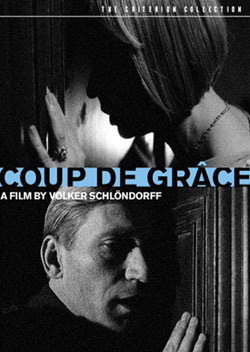DVD REVIEW
The Lost Honor Katharina Blum. Year: 1975. Running time: 106 minutes. Color. Monaural. In German with optional English subtitles. 1.78:1 aspect ratio. Directed by Volker Schlondorff and Margarethe von Trotta. Starring Angela Winkler, Mario Adorf, and Jurgen Prochnow. From The Criterion Collection. Coup de Grâce. Year: 1976. Running time: 98 minutes. Black & white. Monaural. In German and French with optional English subtitles. 1.66:1 aspect ratio. Directed by Volker Schlondorff. Starring Margarethe von Trotta. From The Criterion Collection. Review by Joe Pettit, Jr. The twenty-year marriage between Volker Schlöndorff and Margarethe von Trotta bore artistic fruit in the world of West German cinema. The Criterion Collection has recently released on DVD two of their more noteworthy collaborations from the mid-1970s, The Lost Honor of Katharina Blum, based on a novel by Nobel Prize-winning author Heinrich Boll, and Coup de Grace, based on Marguerite Yourcenar's novel. Each film deals uniquely with forms of terrorism — the terrorism of warfare, terrorism inflicted by the state and press, emotional terrorism in the war between the sexes. Each film powerfully demonstrates the repercussions of the escalation of fear in concordance with a loss of compassion as individuals and as a society.
The Lost Honor of Katharina Blum (1975) is one of those rare movies that has become more relevant with the passage of time. Set in West Germany during the early 1970s, the film deals with the potential political consequences of a one-night stand in a society where everyone is under observation. Katharina Blum (Angela Winkler), an average citizen who works as a housekeeper for a wealthy lawyer, attends a party where she becomes enchanted with a mysterious man, Ludwig Goetten (Jurgen Prochnow). At the end of the evening, she takes him back to her apartment.
The next morning, a squadron of police dressed in riot gear raids her apartment, searching for Goetten, a suspected terrorist. Blum is taken to police headquarters for a grueling interrogation session led by Kommissar Beizmenne (Mario Adorf). These scenes pack an unsettling power. An average, politically unaware citizen is subjected to an intense scrutiny over her possible motivations for sleeping with a terrorist. Her purely instinctual act — and to Blum's way of thinking, a pure and honest response to a romantic scenario — becomes perverted and denigrated. In the mindset of the police, where any citizen is a potential terrorist or collaborator with terrorists, there is no room for romance or "love at first sight" encounters like those found in fairy tales. There are no chance encounters or motive free decisions. Furthermore, in the eyes of society "good women don't invite strange men into their beds. Therefore, Blum has either known Goetten longer than she has let on, or she is a whore and sleeps with many men." There are no other alternatives, no shades of gray.
Katharina Blum's ultimate crime turns out to be that she doesn't play their game — she doesn't submit meekly to their authority and doesn't allow them to set the parameters of her life as a single woman. When the interrogation group takes a break, she refuses to converse with them. In Blum's eyes, they have not only upset the order of her life, they have violated her. In the eyes of the police, they are "just doing their job, not making a personal attack." Ironically it is Beizmenne who takes her rebuff personally. When Blum refuses to converse with him over lunch, he orders her to be taken to a prison cell. He also sets out to destroy her credibility.
Beizmenne leaks "information" to a journalist, Werner Toetges (Dieter Laser), that he suspects Blum has been collaborating with Goetten for two years. Upon her release from the interrogation, Blum sees headlines in the paper proclaiming her as a terrorist collaborator. From here on, the press dogs her every step, interrogating employers and friends about her past. Even Blum's mother, hospitalized in an intensive care ward, is not off-limits from the press. Toetges, posing as a doctor, sneaks into the ward to ask her a few questions about her immoral daughter. His careless and callous disregard ultimately causes the mother's death.
When they don't get the answers they want, the press makes up the facts, creating a notorious public persona for Katharina Blum devoid of any connection to the real person. This very real campaign of terror breaks Blum down emotionally. It robs her of a private life and ultimately forces her down the only avenue she feels she has left to re-establish control in her life — an act of murder. The government and media have warped her into a monster, no trace of which existed before. She is a creature of their making.
Based on an incident in the life of Heinrich Boll, who was accused by the press of being a terrorist sympathizer, The Lost Honor of Katharina Blum is a chilling depiction of unchecked power and a thought-provoking analysis of the responsibilities of the police and the press to the private lives of citizens. For co-directors and co-writers Schlöndorff and von Trotta, this sordid collaboration between the police and the media to publicly humiliate and destroy an individual poses more of a threat to democracy than any terrorist. The film espouses the idea that both the press and the police should be accountable for their actions, and that the unchecked power of these institutions cause greater violence to society and the individual in the long run than any terrorist threat. Because of the film's frightening parallels to the current political situation in the United States, The Lost Honor of Katharina Blum would do well to be required viewing for every U.S. citizen.
The Criterion DVD offers a generous selection of special features, including lengthy interviews with Volker Schlöndorff, Margarethe von Trotta, and cinematographer Jost Vacano. The highlight, though, is the half hour excerpt from the documentary, HEINRICH BOLL, which thoroughly covers the political situation in West Germany during the late 60s and early 70s, and covers the incident between Boll and the Springer press. Highly recommended.
Coup de Grace (1976) is a different affair altogether. For a number of years, Schlöndorff and von Trotta had wanted to adapt Marguerite Yourcenar's novel for the screen. The time never seemed right. The husband-and-wife team believed it was more important for them to focus on the current political situation rather than a story that felt remote or distant in time. After the success of The Lost Honor of Katharina Blum, the team agreed it was time to finally bring Coup de Grace to the screen. The film was also to be a swan song, for von Trotta had decided to give up acting to pursue her directing career. She wanted her last role to be substantial, nuanced, and challenging. The character of Sophie fulfilled that demand.
Set in the Baltic Provinces near Riga amidst a civil war during the 1920s, Coup de Grace opens as Konrad von Revel (Rudiger Kirschstein) returns to his ancestral home, the castle Kratovice, now a stronghold for soldiers fighting against radical Bolsheviks. Accompanied by his childhood friend and fellow officer, Erich von Lhomond (Matthias Habich), Konrad receives a warm welcome from his sister Sophie (von Trotta) and his Aunt Praskovia (Valeska Gert). Unbeknownst to the soldiers, Sophie secretly sympathizes with the Bolsheviks, often crossing firing lines to visit with the collaborators.
One night, Sophie declares her love for Erich von Lhomond. He receives her declaration coolly, questioning whether he has time for love. Some time later, after Konrad and Lhomond return from a trip to headquarters, Sophie overhears gossip among the soldiers that Erich kept close quarters with a loose Parisian singer. This emotional bombshell ignites a twisted contest between Sophie and Lhomond to see who can probe deeper beneath the other's skin. Sophie begins a career of drinking and carousing with the boys, evolving into a regular party girl. She sleeps indiscriminately with many of the soldiers, even becoming engaged to several just to see the look on Lhomond's face. Lhomond cruelly taunts her, telling her that she could never be the woman for him. When Sophie learns from a jilted suitor that her brother Konrad and Lhomond were really the ones who kept close quarters during the trip to headquarters, she runs off into the night to join up with the Bolsheviks. The two are fated to meet one last time, when the dissident group has been captured. As she is sent to the firing squad, Sophie requests Lhomond as her executioner. Lhomond indifferently obliges.
Despite the high incidence of emotional mind games, Coup de Grace is a colder film than The Lost Honor of Katharina Blum. The emotional terrorist attacks launched by Sophie and Lhomond do not evoke the heat of outrage, as does Blum's abuse by the police and press. At times, Sophie and Lhomond's antics verge on annoying. Despite its cooler level of emotional engagement, Coup de Grace proves to be the more difficult film. Gaps of the narrative are left out or implied too subtly, causing disorienting jumps in the flow of the film. The motivations of Sophie and Erich are inscrutable. It's a mystery why one of them doesn't simply leave. Compounding the mysteries, the viewer never comes to a resolution whether Erich is using Sophie to get to her brother Konrad, or vice versa. What does keep the film's momentum flowing are the powerful performances by von Trotta, open and passionate, and Habich, detached and icy. Because of the solid performances and the prevalent ambiguity, Coup de Grace sticks in the mind long after the final scene.
Only one special feature is included with this Criterion DVD, a rather lengthy interview with Volker Schlöndorff and Margarethe von Trotta. Running about an hour, the interview is more of a documentary than a question-and-answer session. The questions are interspersed with clips from the film and archival photographs. Of special interest are the passages where Trotta talks about the changes she made in the screenplay — in particular, increasing the presence of the war and enlarging Sophie's role in the story. The documentary also includes the alternate ending to Coup de Grace, which was shown only in France. In a voiceover, Lhomond ponders over Sophie's motivations for asking him to pull the trigger. Taken word for word from the last paragraph of Yourcenar's novel, this passage goes a long way towards clearing up some of the ambiguities of the film. The irony is that von Trotta, who fought against showing this ending outside of France, now concedes that the ending does work, and probably for the better. Coup de Grace is recommended for those who won't mind the challenge of working through several viewings to come to terms with an enigmatic film.
The Lost Honor of Katharina Blum and Coup de Grâce are now available on DVD from the Criterion Collection in new digital transfers that have been enhanced for widescreen televisions. Special features: both DVDs include video interviews with Volker Schlöndorff and Margarethe von Trotta; The Lost Honor of Katharina Blum also includes a video interview with director of photography Jost Vacano, a documentary on author Heinrich Böll, and an original theatrical trailer. Suggested retail price: $29.95 each. For more information, check out the Criterion Collection Web site.
| ||||||

